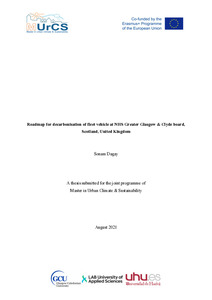Roadmap for decarbonisation of fleet vehicle at NHS Greater Glasgow & Clyde board, Scotland, United Kingdom
Dagay, Sonam (2021)
Dagay, Sonam
2021
Julkaisun pysyvä osoite on
https://urn.fi/URN:NBN:fi:amk-2021110819401
https://urn.fi/URN:NBN:fi:amk-2021110819401
Tiivistelmä
Road transport plays a vital role in the socio-economic development by moving goods, services and people. However, being highly dependent on fossil fuels it has significant impact on global climate change and human health. There have been minimal emission reductions in the transport sector in UK and Scotland. It is now the highest emitter of GHG and a major source of air pollution. The UK and Scottish governments have set legally binding targets of achieving net zero emissions. While committing to phase out conventional fuel vehicles by 2030. Through a case study research strategy and using mixed method approach, the study aims to design a roadmap for decarbonisation of fleet vehicles at the NHS Greater Glasgow and Clyde board. Firstly, an extensive literature review was conducted to understand the background of policies, impacts of transport on GHG emission and air pollution and explore evolution of electric vehicle technology. Then a review of deployment of EVs in Norway and China was conducted to understand best practices, success factors, challenges and effectiveness of electric vehicles in decarbonisation of transport. Thirdly, using secondary data and interviews a SWOT analysis was conducted to identify and analyse the key factors and challenges affecting the decarbonisation of transport. Next backcasting was performed through combination of qualitative desk research and a quantitative analysis to assess the implications of achieving “net zero emission” fleet for two target years (2025 & 2045). Lastly, informed by the literature review, SWOT and outcomes of the backcasting exercise, key interventions were identified and it is presented in the form of a roadmap for achieving “net zero fleet” by 2045 at NHSGGC. The research reveals highly favourable policies and incentives for decarbonisation of transport, high potential of EVs in reducing emissions in UK and Scottish context. Uncertainty in funding, practical capability of EVs, adequacy of charging points and under utilisation of existing fleet vehicles were found to be key challenges in achieving a “net zero fleet” by 2025. It is recommended to undertake mass adoption of EVs with caution to avoid disappointments from technological failure since most of the EV models are yet to be tested and tried. Comprehensive review of the fleet and investigation of the EVs would reduce the risk of technological disappointment and sustainability impacts of mass adoption of EVs.
